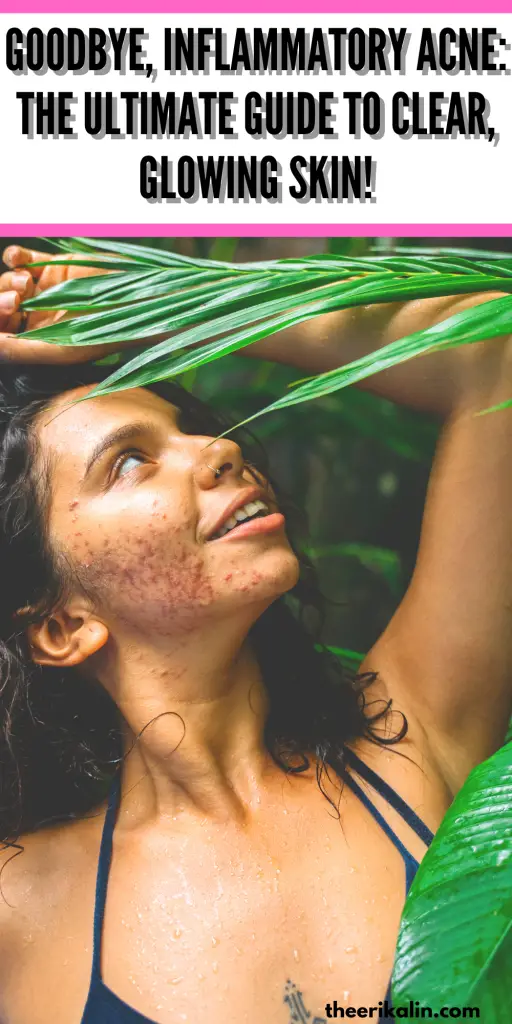
If you’ve ever had acne, you know how frustrating it can be. But if you’re experiencing inflammatory acne, it can be even more challenging to deal with. It is a common skin condition that affects millions of people around the world. In this blog post, we’ll explore what inflammatory acne is, what it looks like, and what causes it. We’ll also provide some natural remedies to help reduce inflammatory acne and promote healthy, clear skin.
This post may contain affiliate links. This means I will earn a commission if you purchase through my link, at no extra cost to you. Please read the full disclosure here.
What is Inflammatory Acne?
It is a type of acne that’s characterized by red, swollen, and painful pimples. It occurs when hair follicles become clogged with excess oil, dead skin cells, and bacteria. The immune system responds to this clogging by sending white blood cells to the affected area, causing inflammation. Inflammatory acne is different from non-inflammatory acne, which includes blackheads and whiteheads.
What Does Inflammatory Acne Look Like?
It can appear in different forms, including papules, pustules, nodules, and cysts. Papules are small, raised bumps that are usually red and tender to the touch. Pustules are similar to papules but have a white or yellowish center. Nodules are large, painful bumps that are deep in the skin, while cysts are similar to nodules but are filled with pus. It can also cause scarring if left untreated.
What Can Cause Inflammatory Acne?
Several factors can contribute to it’s development. These include:
- Hormonal changes: Fluctuations in hormones, especially during puberty, pregnancy, and menopause, can lead to the production of excess oil, leading to clogged pores and acne.
- Genetics: Some people may be more prone to due to their genes.
- Diet: Consuming a diet high in processed foods, refined sugars, and unhealthy fats can worsen acne.
- Stress: High levels of stress can cause the body to produce more cortisol, which can trigger acne breakouts.
How Do You Reduce Inflammatory Acne?
Reducing inflammatory acne involves adopting healthy habits and making lifestyle changes. Here are some tips to help reduce:
- Keep your skin clean: Wash your face twice a day with a gentle cleanser to remove excess oil, dirt, and bacteria.
- Avoid touching your face: Touching your face with dirty hands can transfer bacteria to your skin, worsening acne.
- Use non-comedogenic skincare products: Choose skincare products that won’t clog your pores.
- Eat a healthy diet: Consume a diet rich in whole foods, including fruits, vegetables, and lean proteins.
- Manage stress: Engage in stress-reducing activities like meditation, yoga, and deep breathing.

What Are Natural Remedies for Inflammatory Acne?
Natural remedies can be effective without the use of harsh chemicals. Here are some natural remedies to consider:
- Tea tree oil: Tea tree oil has antibacterial properties that can help reduce acne-causing bacteria.
- Aloe vera: Aloe vera has anti-inflammatory properties that can help reduce redness and swelling associated with acne.
- Green tea: Drinking green tea or applying it topically can help reduce inflammation and promote healthy skin.
- Honey: Honey has antibacterial and anti-inflammatory properties that can help reduce acne breakouts.
- Zinc supplements: Zinc supplements can help reduce inflammation and promote healthy skin.
Conclusion
Inflammatory acne can be a frustrating and uncomfortable condition to deal with, but with the right approach, it can be

Leave a Reply